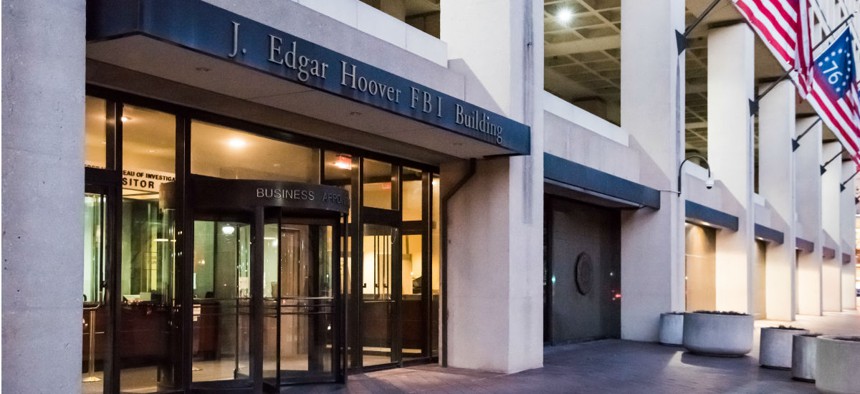
FBI headquarters in Washington. Andriy Blokhin/Shutterstock.com
FBI Internal Survey Shows Morale Was Higher Before Comey was Fired
A “climate survey” taken in February and March suggests employees resent FBI Director Christopher Wray’s low-key style.
A newly disclosed internal poll of FBI employees reveals a sharp decline in confidence in the bureau’s senior leadership under Director Christopher Wray, according to analysis by Lawfare, a legal blogging outlet that obtained the survey results under the Freedom of Information Act.
“Across an array of metrics, both at headquarters and in the FBI’s 56 field offices, employees still express high esprit de corps about the FBI itself and their work for the bureau,” the bloggers said in reviewing data from February and March 2018. “But when asked about confidence in the vision of the FBI director, the value of direct communications from him, the honesty and integrity of senior bureau leaders, or respondents’ respect for those leaders, there is a striking drop in confidence from previous years.”
The context of the survey, which was also published on Monday in the New York Times, includes the firing of Director James Comey, the forced resignation of Deputy Director Andrew McCabe and the public attacks on the FBI by President Trump and some Republican lawmakers. But they do not reflect the more recent Justice Department inspector general report that faulted Comey for his handling of the probe of Hillary Clinton’s emails during the 2016 election.
The survey produced four metrics based on respondents’ agreement with such statements as “I am proud to work for the FBI”; “I have a high level of respect for the FBI’s senior executives”; and “I am onboard with the director’s vision and ideas”; “I am inspired by the Director‘s vision and leadership.”
The most significant drop in positive responses over the past year was for the question “I am inspired by the director’s vision and leadership.”
Agents at the bureau’s Washington headquarters scored “Wray and his team lower than they did the previous leadership team last year, but not by as wide a margin as employees working in the field,” the Times wrote, noting that the White House did not respond to its inquiries.
Lawfare’s analysts stressed that past results showed improvements in morale in both the headquarters and field offices from 2013 through 2016, roughly the tenure of Comey, who was dismissed in May 2017.
“The concern for Wray is whether these numbers may reflect consternation among the workforce over his plough-horse-not-show-horse leadership style—that is, a widespread belief that he is not speaking for the agency aggressively nor defending it actively,” Lawfare wrote. “For institutions like the FBI, morale and leadership matter. Employees with a shortage of the former will work less hard and collaborate less effectively.”
The analysts noted that some questions used in the climate survey in previous years did not appear this year, among them asking whether the respondent agreed that “employee morale is important to the FBI’s senior executives.”
The writers expressed sympathy with Wray’s decision to speak out only “episodically” to defend the FBI against attacks from conservative activists and media, noting that “If he speaks out aggressively, he will antagonize the president and could get himself fired, losing the ability to defend the organization more quietly and ensure its independence at a time of genuine crisis.”
Asked to respond, Thomas O’Connor, president of the FBI Agents Association, said in a statement that his group “continues to stand” with Wray “in defending attacks on our character and demeaning comments about the bureau”:
“As the survey shows, these attacks do not deter agents from continuing to do what we have always done—dedicate our lives to protecting the American people. FBIAA meets with Director Wray and senior leaders in the bureau on a regular basis to discuss issues of concern for agents. Director Wray believes in the centrality of agents to the bureau’s mission and to ensuring that agents continue to have the tools we need to remain the world’s premier law enforcement organization.”
Nancy Savage, executive director of the Society of Former Special Agents of the FBI, told Government Executive via email that “the survey results were tabulated during a period of considerable internal changes at the top of the FBI, involving the removal, reassignment or resignation of a number of top executives. Director Wray has taken over the helm of the FBI during an extremely difficult time when many of the problems of the Comey administration are being aired publicly. He is having to build his own team amidst this controversy, answer to Congress as well as a multitude of other separate investigations focused on what went wrong with the FBI previously.”
Savage said Wray “is extremely well thought of” by agency employees at FBI headquarters and in the field offices: “He has an excellent reputation with our members who worked with him as both a line prosecutor and as a deputy attorney general at the Department of Justice. This reputation continues today,” she said, citing his “calm response” to events and continued changes “to ensure that traditional FBI processes are restored at the FBI.”
Image via Andriy Blokhin/Shutterstock.com.







